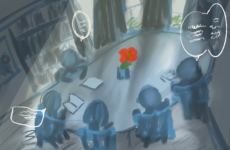What are your religious or spiritual beliefs? Why do you adhere to them? What’s your story? Growing up in a religiously devoted Christian family, church, home, and social life were almost inextricably intertwined. Living with a single mom, I consider my church community as part of my actual family, leaning on them for support, encouragement, and counsel. Even at Choate, being separated from that community, I try to maintain a connection through attending weekly services and having personal devotion. But I continue to wrestle with a question that I’ve simply tossed aside in the past: “Why am I Christian?” The beauty that is our cultural and spiritual diversity often conflicts with the notion of there being one correct religion, and my interactions over the years with students on this campus continue to highlight that conflict. Recently, I asked a variety of Choate students about their reasoning for their spiritual convictions. My goal was to identify patterns and use that to better understand why I adhere to my own religion.
Religion often carries a cultural affinity, and this relationship attaches religion to our very identity. Said Roshni Surpur ’20 of the Hindu faith, “When I do not follow the daily prayers or other rules I should have been practicing, [I feel I am] losing touch with my culture and background. It’s something I hope to work on.” As her family is devoted to Hindu traditions, she “never really had a say in what she believed” and although today identifying as “not very religious,” she says, “I am still grateful for having been able to learn about a religion based off of my culture [— a culture] I’m proud of.”

The Director of Spiritual Life, chaplains, and faculty advisers in Buddhist, Jewish, Muslim, Protestant, and Roman Catholic traditions guide students in a variety of religious expressions.
The relationship between religion and culture is a reality for many at Choate, yet beyond that, some cite that they find social good through their religious devotion. Sophie Hare ’18 says that what she loves about Judaism is its “emphasis on forgiveness.” Although growing up in a Jewish home, Sophie says she wasn’t forced into it: “I chose [it].”
Mark Su ’18, a Buddhist, also made a personal decision to follow his religion. He reported, “In Buddhism, there are four precepts: Do no harm, say no lie, don’t steal, and don’t consume anything that clouds your mind. I choose to follow all four. I especially enjoy that altruism is essential to the development of a true Buddhist.” As a Christian, such rhetoric resonates with me, reminding me of Jesus’s counsel to love others as one loves oneself because such is the fulfilment of the whole law.
In addition to external, communal good, religion often improves personal well-being. Katie Lee ’18 said, “I can’t imagine life without Christianity; it’s where I get my joy, perspective, gratitude, and stability. Knowing I’ll always have Christianity in my life no matter what I’m doing, or whom I’m with gives me such comfort.” And this sense of fulfillment encourages Katie to share her faith with others. “My responsibility as a Christian is to spread the love of Christ.” Su agreed, claiming that Buddhists “actively spread their [good] karma to others to make others’ lives better as well.”
Despite all that religion achieves for many on campus, perhaps religious devotion is not all that necessary to access those things. Said Alan Luo ’18, a professed atheist, “To me, religion has always been about faith. There are some things you’re just supposed to believe. On the other hand, one of my values is to always be critical and questioning of everything, to never take anything at face value. Therefore, religion poses a fundamental philosophical difference in the way I think about things. This is not to say that I am not spiritual. I think that religious spirituality is too focused on finding peace in something you can never observe. Rather, I prefer to take solace in concrete, observable things, like nature, knowledge, or music.”
So why am I a Christian? Through the values of Christianity, I feel a meaningful connection both to my loved ones and community. It gives me foundation, influences my identity, and guides me through life. I doubt I’ll stop being a Christian, but what I continue to learn every day, is that across all different cultural and spiritual backgrounds, our shared commitment to appreciate and cherish life is what should bind us all together.




